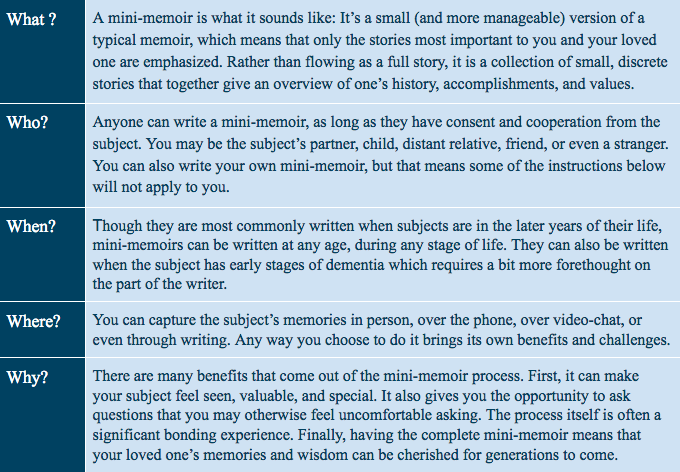Mini-memoirs: an efficient way to capture memories of a loved one
Capturing memories of a loved one in a way that befits their character and legacy is a difficult task. Often it can feel like there’s so much to cover that the mere thought of trying is overwhelming. However, neglecting to do so may mean future generations miss out on enjoying those memories. As an easy-to-follow procedure that focuses on the key stories while doing justice to your loved one, the mini-memoir represents a great solution to this problem.
Before we continue, here are answers to some common questions that may arise as you start this process, beginning with the most important, what is a mini-memoir?:
Now the important question is, How? The following instructions are meant to serve as a general outline of how to create a mini-memoir. Of course, you can make as many changes to the process as you want—do what works best for you.
Choose your subject
You may already have a subject in mind, but if not, consider the older adults in your life. Grandparents, family friends, and mentors are common subjects, but you can choose whoever you want!
Ask your desired subject if they want to participate
Consider the best way to ask your subject if they would like to participate in this process. Not everyone will be enthusiastic at the prospect, so make sure to ask gently and thoroughly explain what the process entails. If your subject seems willing, but says something to the effect of “I am not special enough,” reassure them that you have chosen to ask them for a reason. However, if your subject seems firm in saying “no,” make sure to respect their wishes.
Make a plan with your subject
Once you have gotten consent from your subject, make a plan. These are some of the main considerations you will need to discuss with your subject:
How long will the mini-memoir be?
How many conversations are necessary to reach that length?
When will your conversations take place? It can be a good idea to talk once or twice weekly on a consistent schedule, so you can both set time aside that is specifically for this activity.
How would you like to converse? Discussions may take place in person, over the phone, online, or through email. Also consider if a translator will be necessary, depending on any potential language barriers.
What is your timeline for completing the memoir?
To whom will the memoir be distributed? Make sure to discuss your subject’s preferences about privacy so their stories are not shared with anyone beyond their boundaries.
Develop a list of questions
Before having your first conversation with your subject, it’s important to develop a list of questions so that the conversation is somewhat guided. You don’t have to stick to these, but it is good to have a general idea of the kind of information you hope to get. You may focus more on the history of your subject, meaning you want a specific timeline of any major events in their life, or you may be more focused on discrete stories. You should base your line of questioning on what you hope to end up with. You can also ask your subject if they have particular areas of focus they want to discuss, and also whether there are any topics that are off-limits. Some common themes for questions include:
Childhood/adolescence/young adulthood/middle age/old age
Favorite food/movie/sport/book/artist
Happy/funny/sad/difficult moments
Advice to the younger generations
Get memories from your subject
Once you have developed a plan for discussion with your subject, it is important to stick with your schedule as much as possible. Unless you are using email, it is a great idea to record your conversations so that you can be fully present in the moment, and take notes later on. Make sure to ask for explicit consent from your subject to be recorded, and if they don’t feel comfortable with that it is totally okay! If this is the case, just let them know you may have to slow them down on occasion so that you can fully type out what they say.
Don’t be afraid to let the conversation go astray from your list of questions, because they are meant to serve as more of conversation starters. Remember that your subject is telling the stories they want to tell, and you shouldn’t be too controlling of their narrative.
Note: if your subject is grappling with an adverse mental health situation such as dementia, you may need to take more responsibility for the direction of the conversation depending on the status of your subject’s condition. You may also need to exercise additional patience. If your subject tells the same story multiple times, try not to cut them off unless you can do so politely. You want this to be an enjoyable experience for them. Also remember that those with dementia often still have excellent long-term memories, and will likely remember a great amount from their earlier life.
An excerpt from the mini-memoir created by the author with her grandfather

